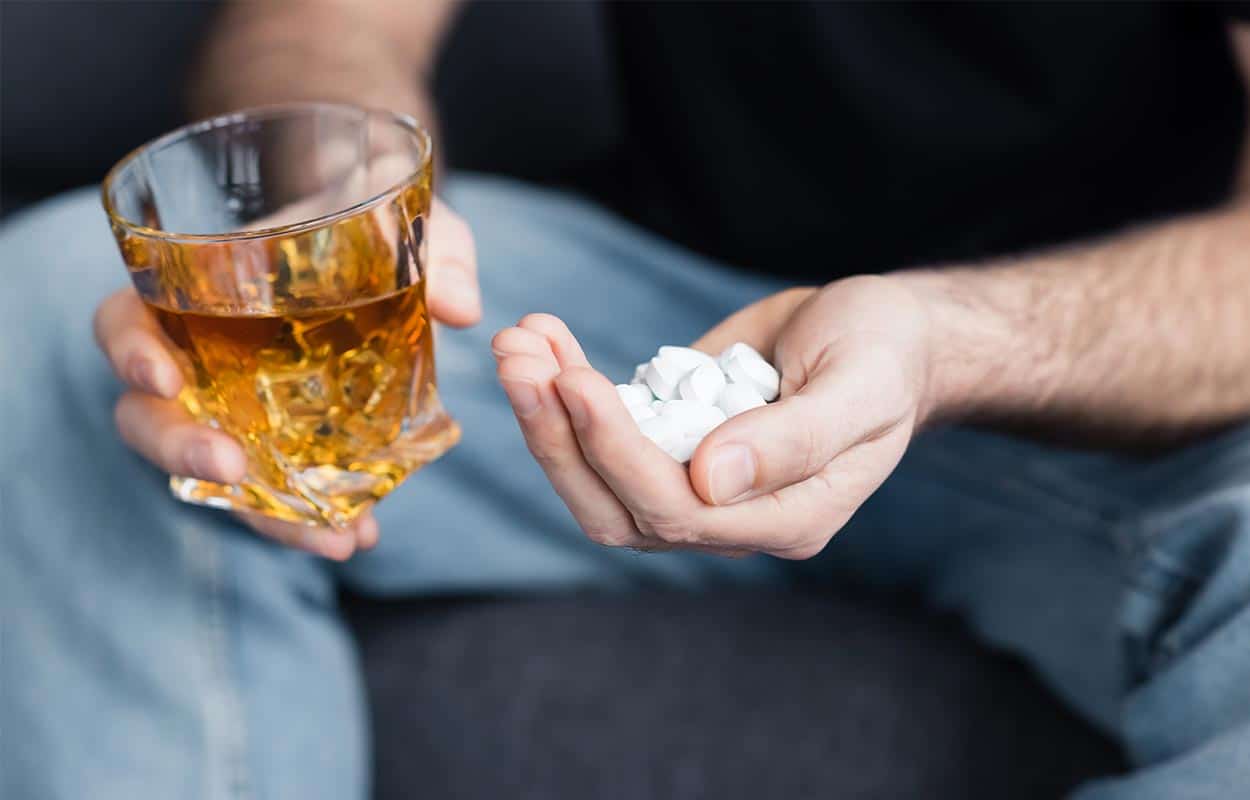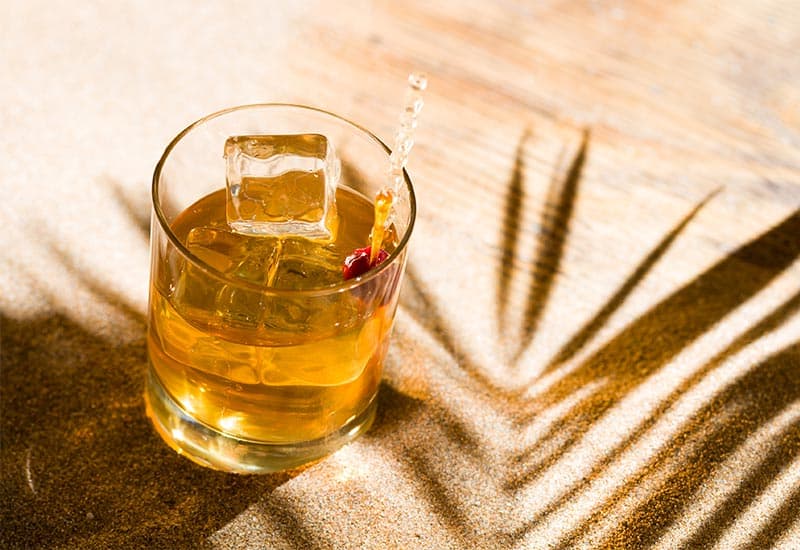Drinking Alcohol With Adderall: Everything You Need to Know
Medically Reviewed By:
Written By:
Updated On: August 11, 2025
Last Medically Reviewed on: August 11, 2025

Table of Contents
Key Points
- Combining Adderall and alcohol can cause organ damage, a heart attack, and other serious issues.
- Adderall and its metabolites remain in the body for longer than you may think, increasing the risk of harmful interactions.
- Abstaining from alcohol use altogether while on Adderall is the best way to avoid harmful consequences.
Whether by accident or for recreational purposes, mixing stimulants with alcohol is a dangerously common occurrence.
Many people underestimate the risks involved when combining alcohol with Adderall, which creates unpredictable and potentially fatal interactions in the body that can damage your vital organs.
Understanding how Adderall and alcohol affect the body and how this combination compounds multiple risk factors is key to making sound decisions for your overall wellness.
A Brief Overview of Adderall
Adderall is a prescription, amphetamine-based stimulant medication used to treat attention-deficit hyperactivity disorder (ADHD) and narcolepsy.[1] The two active ingredients in Adderall are amphetamine and dextroamphetamine.
This medication primarily interacts with your brain’s dopamine and norepinephrine systems, which are two key “pathways” along which addiction can be formed.
How Adderall Works in Your Body
Your brain sends chemical messengers, or neurotransmitters, between nerves to signal a wide range of essential functions. Adderall selectively increases the activity of two of these chemical messengers, dopamine and norepinephrine, which help to regulate hyperactivity and improve focus in people with ADHD.[2]
Usually, when one neuron has finished sending a signal to another neuron, it reabsorbs any residual neurotransmitters back into itself. Adderall prevents this reabsorption in the case of dopamine and norepinephrine. This is what creates higher concentrations of these chemicals in the brain.
As a result, you feel more focused, alert, and productive. Adderall also affects your cardiovascular system. It can cause elevated heart rate and blood pressure, even when used as directed.[3]
Common Uses and Side Effects
Though Adderall carries a significant potential for abuse, it also promotes legitimate medical benefits that help people with ADHD and narcolepsy function more productively in their day-to-day lives.
Common side effects of Adderall include:[4]
- Increased heart rate and blood pressure
- Loss of appetite and weight loss
- Insomnia and restlessness
- Anxiety and irritability
- Dry mouth and constipation
Under the proper medical supervision, these side effects are generally manageable. However, they become much more serious when alcohol enters the picture.
The College and Young Adult Prescription Stimulant Problem
The stress to perform academically, combined with a party lifestyle, encourages the use of alcohol and Adderall in college students.
In a national sample of 900 students, 9.8% of college-age participants reported using prescription stimulants that were not prescribed to them during the past 30 days.[5]
Academic Pressure
Students often use Adderall to pull all-nighters studying. Then they drink alcohol to “come down” or socialize. This pattern is extremely dangerous.
Research shows students who mix these substances don’t actually perform better academically. Meanwhile, they face serious health risks.[6]
Social Drinking Culture
College drinking culture normalizes excessive alcohol use. Adding stimulants to the mix creates false confidence about drinking capacity, increasing the chance of alcohol poisoning. Students may consume far more than the safe limit.
What Happens When You Combine Alcohol and Adderall?
The question “Can you drink on adderall?” has a clear answer: absolutely not. Mixing these substances creates dangerous interactions, including an increased risk of heart attack. This is just one of several risks associated with mixing alcohol and Adderall.[7]
The Masking Effect
Since alcohol is a depressant and Adderall is a stimulant, Adderall can mask the effects of alcohol. In other words, you may feel less impaired by the effects of the alcohol than you actually are when you combine the two. This often leads to people drinking beyond their usual limitations.
This study found that rats experiencing alcohol withdrawal symptoms showed decreased severity of symptoms when they were given amphetamine, confirming this masking effect.[8]
Heavy Load on the Liver
Adderall and alcohol compete for the same liver enzymes. Specifically, each of these substances requires CYP450 enzymes to be metabolized successfully.[9]
When you consume both of these substances, the sharply increased load on the liver will cause one or both substances to be processed more slowly than usual. Toxic metabolites are allowed to build up in your system, and the effects of this potentially deadly combination take longer to run their course.[10]
Cardiovascular Strain
Similar to its effects on the liver, the combination of alcohol and adderall places the cardiovascular system under immense strain. Alcohol can initially raise your heart rate (despite being a depressant), compounding the ability of Adderall to do the same.[11]
This combination can cause heart rhythm abnormalities, heart attack, or stroke, even among young and healthy people.[12]
A Dangerous Rhythm: Adderall in the Morning, Alcohol at Night
It may seem like a more responsible decision to space your Adderall and alcohol consumption apart, and with enough spacing, it is. However, many people don’t understand that taking Adderall in the morning and alcohol at night still presents an opportunity for harmful interactions to occur.
Extended Presence in Your System
Adderall stays in your system longer than you might think. Immediate-release formulations last four to six hours, while extended-release formulations can last up to twelve hours.[13] Importantly, this refers to how long you feel the medication’s effects, not the time it takes to be eliminated entirely from the body.
Also, the byproducts or metabolites your body creates when processing Adderall remain in your system even longer and can still interact with alcohol that you consume later in the evening.
Accumulated Toxicity
The metabolites associated with both substances accumulate in your body, allowing for harmful interactions even when you are spacing Adderall and alcohol twelve hours apart.
In other words, timing may help reduce the severity of harmful drug interactions associated with these two substances, but it by no means eliminates the possibility of interactions from occurring.
Warning Signs to Watch For
Recognizing the signs of dangerous interactions is crucial. Symptoms can develop quickly and become life-threatening.
Immediate Danger Signs
Call 911 immediately if you experience:
- Chest pain or irregular heartbeat
- Difficulty breathing
- Severe headache or confusion
- Seizures or loss of consciousness
- Extreme agitation or panic
Other Concerning Symptoms
- Nausea and vomiting
- Extreme fatigue or dizziness
- Rapid mood swings
- Inability to sleep or stay awake
- Tremors or muscle weakness
By the way, these symptoms can appear hours after consuming both substances. Don’t wait to seek help.
Safe Alternatives and Harm Reduction
By following a few simple steps, you can dramatically reduce the risk of serious side effects associated with combining Adderall and alcohol.
First, communicate honestly and openly with your healthcare provider about your alcohol use (in reference to concurrent Adderall use). Your doctor will work with you to make an informed decision that best preserves your safety and overall well-being.
The best course of action is to avoid alcohol entirely while using Adderall. At the very least, doctors may advise you to wait 24 hours (or ideally, longer) since your last dose before consuming small amounts of alcohol.
If, like many, you turn to alcohol to de-stress and relax, you can rely on these alternative methods:
- Regular exercise and activity
- Meditation and mindfulness
- Adequate sleep
- Choosing “dry” social activities
The Bottom Line
Drinking alcohol with Adderall is never advised. If you find yourself or a loved one struggling with alcohol addiction and/or Adderall misuse, know that there are compassionate, tailored treatment options available to help you. Professional detox and rehab services will meet you where you are, providing a practical framework in which you can grow in your recovery and forge healthier habits.
Don’t wait until it’s too late. Find the help you need and move forward with a brighter future ahead.
Frequently Asked Questions
What other substances should I avoid while on Adderall?
As with many prescription drugs, there is a lengthy list of medications (and even supplements) that you should avoid while taking Adderall. These include some antacids, antihistamines, SSRI medications, other stimulants, and more. If you have questions or concerns about how Adderall may interact with other medicines or supplements you’re taking, ask your healthcare provider for more information.
Can I take Adderall to sober up after drinking?
Absolutely not. Using Adderall to counteract alcohol’s effects is extremely dangerous. This practice increases your risk of heart problems and overdose.[14] Adderall won’t actually make you less intoxicated – it only masks the feeling. Your blood alcohol level remains the same, putting you at serious risk.
What should I do if I accidentally mixed Adderall and alcohol?
Seek medical attention immediately, especially if you experience chest pain, difficulty breathing, or irregular heartbeat. Even if you feel okay, dangerous interactions can develop hours later. Don’t drive or operate machinery. Stay hydrated and have someone closely monitor you. When in doubt, go to the emergency room or call 911.
Can you drink on Adderall if you only have a small amount of alcohol?
No amount of alcohol is considered safe while taking Adderall. Even small amounts can create dangerous interactions. The combination affects everyone differently, and there’s no way to predict your individual response. The only safe approach is complete avoidance of alcohol while using Adderall.
There is a Better Way to Live. It's Time to Get the Help You Deserve.
Take the first step in getting your life back. Speak with our admissions team today.Sources
[1][2][3][4][13]Label for adderall – accessdata.fda.gov. AccessData.FDA. (n.d.-b). https://www.accessdata.fda.gov/drugsatfda_docs/label/2017/011522s043lbl.pdf
[5]Fairman, R. T., Vu, M., Haardörfer, R., Windle, M., & Berg, C. J. (2020). Prescription stimulant use among young adult college students: Who uses, why, and what are the consequences? Journal of American College Health, 69(7), 767–774. https://pmc.ncbi.nlm.nih.gov/articles/PMC7363509/
[6]Vasan S, Murray BP, Olango GJ. Amphetamine Toxicity. [Updated 2024 May 6]. In: StatPearls [Internet]. Treasure Island (FL): StatPearls Publishing; 2025 Jan-. Available from: https://www.ncbi.nlm.nih.gov/books/NBK470276/
[7][12][14]Jiao, X. (2009). Response: Re: Myocardial infarction associated with Adderall XR and alcohol use in a young man. The Journal of the American Board of Family Medicine, 22(5), 590–590. https://pubmed.ncbi.nlm.nih.gov/19264944/
[8]Popkin, S., Nanchanatt, A., Mauterer, M. I., & Rhoads, D. E. (2018). Co-administration of amphetamine with alcohol results in decreased alcohol withdrawal severity in adolescent rats. Behavioural Pharmacology, 29(6), 547–550. https://pubmed.ncbi.nlm.nih.gov/29595541/
[9]Martin D, Le JK. Amphetamine. [Updated 2023 Jul 31]. In: StatPearls [Internet]. Treasure Island (FL): StatPearls Publishing; 2025 Jan-. Available from: https://www.ncbi.nlm.nih.gov/books/NBK556103/
[10]Zakhari S. (2006). Overview: how is alcohol metabolized by the body?. Alcohol research & health : the journal of the National Institute on Alcohol Abuse and Alcoholism, 29(4), 245–254. https://pmc.ncbi.nlm.nih.gov/articles/PMC6527027/
[11]Jain A, Yelamanchili VS, Brown KN, et al. Holiday Heart Syndrome. [Updated 2024 Jan 16]. In: StatPearls [Internet]. Treasure Island (FL): StatPearls Publishing; 2025 Jan-. Available from: https://www.ncbi.nlm.nih.gov/sites/books/NBK537185/



